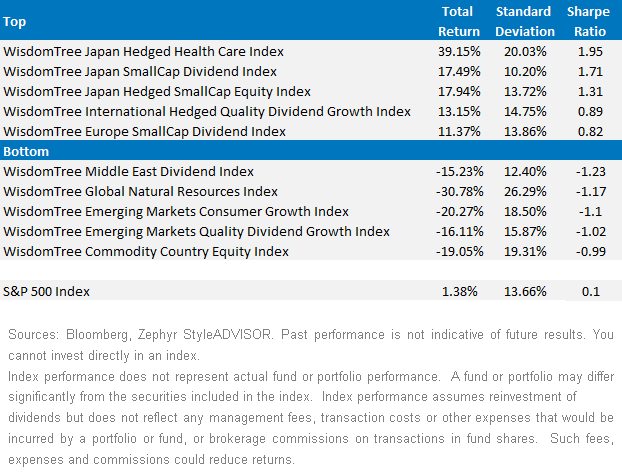WisdomTree’s Best and Worst Risk Adjusted Returns in 2015


 For definitions of Indexes in the chart visit our glossary.
The best risk-adjusted returns for investors were generally found abroad, specifically in Japan. With the U.S. dollar enjoying its third-greatest bull run of the last 30 years, it is no surprise that currency-hedging international exposure influenced the top five risk-adjusted winners. Indeed, three of our top five strategies mitigated the impact of foreign currency and provided exposure to foreign stocks, primarily those incorporated in Europe and Japan.
Interestingly, owning Japanese small caps with exposure to the yen generated the lowest volatility of any of the strategies on this list. With the Japanese yen ending the year virtually unchanged against the U.S. dollar, it comes as no surprise that both the hedged and the unhedged version of WisdomTree’s Japanese small-cap strategy made it on our top five list for 2015. Small-company performance in Japan, as well as small-cap performance across Europe, is yet another reminder that U.S. investors should look to international small caps if they wish to fully tap the power of the so-called "size factor."
We believe Japan is likely to remain a focal point for investors in 2016. The Bank of Japan (BOJ) added to its already aggressive monetary easing program in January. This recent action should also keep currency-hedging strategies in focus as the divergent monetary policies between the BOJ and the U.S. Federal Reserve are likely to put renewed pressure on the yen.
Worst Performers in 2015: Emerging Markets
One of the poorest-performing asset classes in 2015 were the emerging markets and commodity-related investments. Not surprisingly, that is where WisdomTree saw its weakest absolute and risk-adjusted performance. Since the summer of 2014, oil has endured a dramatic decline in price, impacting commodity prices generally and the fortunes of global energy and basic materials producers in particular. The strong dollar, the economic slowdown in China and the deceleration in global trade have all contributed to the profit recession that battered the stock prices of emerging market companies. Predictably, these two groups of stocks returned the worst risk-adjusted returns among WisdomTree’s equity Indexes in 2015.
Conclusion
The old adage that past performance is no guarantee of future results is not just boilerplate disclosure language. It actually makes a great deal of sense—in part because markets revert to the mean, in part because the world changes from year to year and different investing styles come in and out of favor. But with 2016 off to a rocky start, it is worth noting where pockets of strength appeared in 2015. With the S&P 500 essentially flat in 2015, it’s worth remembering that there was a strong equity rally happening somewhere. Having a full palette of strategies to choose from, that cover markets beyond the beaten path, can sometimes help you find it.
For definitions of Indexes in the chart visit our glossary.
The best risk-adjusted returns for investors were generally found abroad, specifically in Japan. With the U.S. dollar enjoying its third-greatest bull run of the last 30 years, it is no surprise that currency-hedging international exposure influenced the top five risk-adjusted winners. Indeed, three of our top five strategies mitigated the impact of foreign currency and provided exposure to foreign stocks, primarily those incorporated in Europe and Japan.
Interestingly, owning Japanese small caps with exposure to the yen generated the lowest volatility of any of the strategies on this list. With the Japanese yen ending the year virtually unchanged against the U.S. dollar, it comes as no surprise that both the hedged and the unhedged version of WisdomTree’s Japanese small-cap strategy made it on our top five list for 2015. Small-company performance in Japan, as well as small-cap performance across Europe, is yet another reminder that U.S. investors should look to international small caps if they wish to fully tap the power of the so-called "size factor."
We believe Japan is likely to remain a focal point for investors in 2016. The Bank of Japan (BOJ) added to its already aggressive monetary easing program in January. This recent action should also keep currency-hedging strategies in focus as the divergent monetary policies between the BOJ and the U.S. Federal Reserve are likely to put renewed pressure on the yen.
Worst Performers in 2015: Emerging Markets
One of the poorest-performing asset classes in 2015 were the emerging markets and commodity-related investments. Not surprisingly, that is where WisdomTree saw its weakest absolute and risk-adjusted performance. Since the summer of 2014, oil has endured a dramatic decline in price, impacting commodity prices generally and the fortunes of global energy and basic materials producers in particular. The strong dollar, the economic slowdown in China and the deceleration in global trade have all contributed to the profit recession that battered the stock prices of emerging market companies. Predictably, these two groups of stocks returned the worst risk-adjusted returns among WisdomTree’s equity Indexes in 2015.
Conclusion
The old adage that past performance is no guarantee of future results is not just boilerplate disclosure language. It actually makes a great deal of sense—in part because markets revert to the mean, in part because the world changes from year to year and different investing styles come in and out of favor. But with 2016 off to a rocky start, it is worth noting where pockets of strength appeared in 2015. With the S&P 500 essentially flat in 2015, it’s worth remembering that there was a strong equity rally happening somewhere. Having a full palette of strategies to choose from, that cover markets beyond the beaten path, can sometimes help you find it.
Important Risks Related to this Article
Foreign investing involves special risks, such as risk of loss from currency fluctuation or political or economic uncertainty.
Hedging can help returns when a foreign currency depreciates against the U.S. dollar, but it can hurt when the foreign currency appreciates against the U.S. dollar.
Investments in emerging, offshore or frontier markets are generally less liquid and less efficient than investments in developed markets and are subject to additional risks, such as risks of adverse governmental regulation and intervention or political developments.
Investments focused in Japan or Europe increase the impact of events and developments associated with those regions, which can adversely affect performance.


